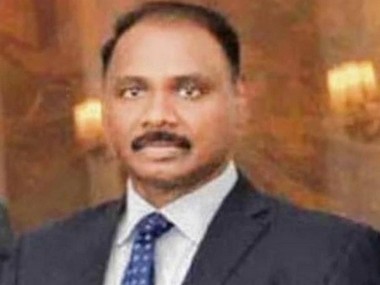IAS officer Girish Chandra Murmu took oath as the first Lieutenant Governor of Jammu and Kashmir on Thursday following the bifurcation of the state into two union territories. Murmu, who will turn 60 in November, was administered the oath of office by Jammu and Kashmir Chief Justice Gita Mittal at a function held at Raj Bhawan at the foothills of the Zaberwan range.
Srinagar: Girish Chandra Murmu takes oath as the first Lt. Governor of the Union territory of Jammu and Kashmir. The oath was administered by Chief Justice of J&K High Court, Gita Mittal. pic.twitter.com/UtPJHx8TAb
— ANI (@ANI) October 31, 2019
The warrant of appointment of Murmu, a 1985 batch IAS officer from Gujarat, was read out by Chief Secretary BVR Subrahmanyam. BJP leader Jugal Kishore and Rajya Sabha MP and PDP member Nazir Laway were among the over 250 guests present the function. Murmu was received by Advisor Farooq Khan and Subrahmanyam at Srinagar International Airport. Murmu served as expenditure secretary at the Centre before getting appointed as Lieutenant Governor of Jammu and Kashmir. Earlier in the day, Radha Krishna Mathur took oath as the first Lieutenant Governor of Union Territory of Ladakh. Murmu is a 1985-batch Gujarat Cadre IAS officer and was appointed as Secretary, Department of Expenditure in March. Born on 21 November 1959, Murmu is from Odisha. Born on 21 November 1959, Murmu, a native of Odisha, had worked closely with Prime Minister Narendra Modi in Gujarat as his additional principal secretary during his tenure as chief minister. Murmu is an MBA in public service and also holds a post-graduate in political science. He served as expenditure secretary at the Centre before getting appointed as Lieutenant Governor of Jammu and Kashmir Satya Pal Malik, who was the last governor of Jammu and Kashmir, moved to Goa for the remainder of his tenure as governor. Malik was first appointed governor of Bihar in September 2017 and moved to Jammu and Kashmir in August last year. The two union territories — Ladakh and Jammu and Kashmir — came into existence on Thursday after the central government abrogated the special status of the state and bifurcated it on 5 August. With inputs from agencies


)

)
)
)
)
)
)
)
)



